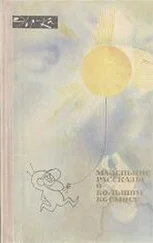‘As I fell over I blazed off both barrels of my gun, though, indeed, it was like attacking an elephant with a pea-shooter to imagine that any human weapon could cripple that mighty bulk. And yet I aimed better than I knew, for, with a loud report, one of the great blisters upon the creature’s back exploded with the puncture of the buck-shot. It was very clear that my conjecture was right, and that these vast, clear bladders were distended with some lifting gas, for in an instant the huge, cloud-like body turned sideways, writhing desperately to find its balance, while the white beak snapped and gaped in horrible fury. But already I had shot away on the steepest glide that I dared to attempt, my engine still full on, the flying propeller and the force of gravity shooting me downwards like an aerolite [176]. Far behind me I saw a dull, purplish smudge growing swiftly smaller and merging into the blue sky behind it. I was safe out of the deadly jungle of the outer air.
‘Once out of danger I throttled my engine, for nothing tears a machine to pieces quicker than running on full power from a height. It was a glorious, spiral vol-plane from nearly eight miles of altitude – first, to the level of the silver cloud-bank, then to that of the storm-cloud beneath it, and finally, in beating rain, to the surface of the earth. I saw the Bristol Channel [177]beneath me as I broke from the clouds, but, having still some petrol in my tank, I got twenty miles inland before I found myself stranded in a field half a mile from the village of Ashcombe. There I got three tins of petrol from a passing motor-car, and at ten minutes past six that evening I alighted gently in my own home meadow at Devizes, after such a journey as no mortal upon earth has ever yet taken and lived to tell the tale. I have seen the beauty and I have seen the horror of the heights – and greater beauty or greater horror than that is not within the ken of man.
‘And now it is my plan to go once again before I give my results to the world. My reason for this is that I must surely have something to show by way of proof before I lay such a tale before my fellow-men. It is true that others will soon follow and will confirm what I have said, and yet I should wish to carry conviction from the first. Those lovely iridescent bubbles of the air should not be hard to capture. They drift slowly upon their way, and the swift monoplane could intercept their leisurely course. It is likely enough that they would dissolve in the heavier layers of the atmosphere, and that some small heap of amorphous jelly might be all that I should bring to earth with me. And yet something there would surely be by which I could substantiate my story. Yes, I will go, even if I run a risk by doing so. These purple horrors would not seem to be numerous. It is probable that I shall not see one. If I do I shall dive at once. At the worst there is always the shot-gun and my knowledge of…’
Here a page of the manuscript is unfortunately missing. On the next page is written, in large, straggling writing:
‘Forty-three thousand feet. I shall never see earth again. They are beneath me, three of them. God help me; it is a dreadful death to die!’
Such in its entirety is the Joyce-Armstrong Statement. Of the man nothing has since been seen. Pieces of his shattered monoplane have been picked up in the preserves of Mr. Budd-Lushington upon the borders of Kent and Sussex, within a few miles of the spot where the note-book was discovered. If the unfortunate aviator’s theory is correct that this air-jungle, as he called it, existed only over the south-west of England, then it would seem that he had fled from it at the full speed of his monoplane, but had been overtaken and devoured by these horrible creatures at some spot in the outer atmosphere above the place where the grim relics were found. The picture of that monoplane skimming down the sky, with the nameless terrors flying as swiftly beneath it and cutting it off always from the earth while they gradually closed in upon their victim, is one upon which a man who valued his sanity would prefer not to dwell. There are many, as I am aware, who still jeer at the facts which I have here set down, but even they must admit that Joyce-Armstrong has disappeared, and I would commend to them his own words: ‘This note-book may explain what I am trying to do, and how I lost my life in doing it. But no drivel about accidents or mysteries, if YOU please.’
Outside the large single window the crepuscular [178]light was dying out slowly in a great square gleam without colour, framed rigidly in the gathering shades of the room.
It was a long room. The irresistible tide of the night ran into the most distant part of it, where the whispering of a man’s voice, passionately interrupted and passionately renewed, seemed to plead against the answering murmurs of infinite sadness.
At last no answering murmur came. His movement when he rose slowly from his knees by the side of the deep, shadowy couch holding the shadowy suggestion of a reclining woman revealed him tall under the low ceiling, and sombre all over except for the crude discord of the white collar under the shape of his head and the faint, minute spark of a brass button here and there on his uniform.
He stood over her a moment, masculine and mysterious in his immobility, before he sat down on a chair nearby. He could see only the faint oval of her upturned face and, extended on her black dress, her pale hands, a moment before abandoned to his kisses and now as if too weary to move.
He dared not make a sound, shrinking as a man would do from the prosaic necessities of existence. As usual, it was the woman who had the courage. Her voice was heard first – almost conventional while her being vibrated yet with conflicting emotions.
‘Tell me something,’ she said.
The darkness hid his surprise and then his smile. Had he not just said to her everything worth saying in the world – and that not for the first time!
‘What am I to tell you?’ he asked, in a voice creditably steady. He was beginning to feel grateful to her for that something final in her tone which had eased the strain.
‘Why not tell me a tale?’
‘A tale!’ He was really amazed.
‘Yes. Why not?’
These words came with a slight petulance, the hint of a loved woman’s capricious will, which is capricious only because it feels itself to be a law, embarrassing sometimes and always difficult to elude.
‘Why not?’ he repeated, with a slightly mocking accent, as though he had been asked to give her the moon. But now he was feeling a little angry with her for that feminine mobility that slips out of an emotion as easily as out of a splendid gown.
He heard her say, a little unsteadily with a sort of fluttering intonation which made him think suddenly of a butterfly’s flight:
‘You used to tell – your – your simple and – and professional – tales very well at one time. Or well enough to interest me. You had a – a sort of art – in the days – the days before the war.’
‘Really?’ he said, with involuntary gloom. ‘But now, you see, the war is going on,’ he continued in such a dead, equable tone that she felt a slight chill fall over her shoulders. And yet she persisted. For there’s nothing more unswerving in the world than a woman’s caprice.
‘It could be a tale not of this world,’ she explained.
‘You want a tale of the other, the better world?’ he asked, with a matter-of-fact surprise. ‘You must evoke for that task those who have already gone there.’
‘No. I don’t mean that. I mean another – some other – world. In the universe – not in heaven.’
‘I am relieved. But you forget that I have only five days’ leave.’
Читать дальше
Конец ознакомительного отрывка
Купить книгу












